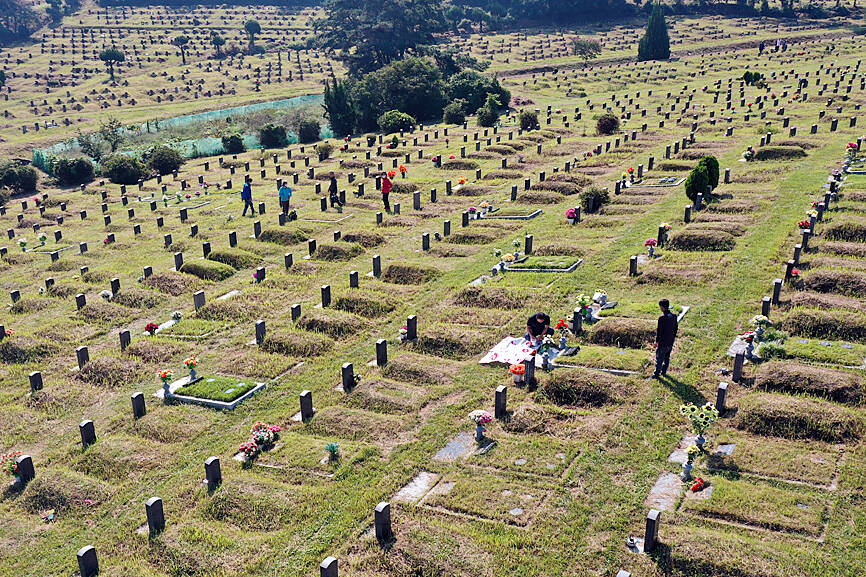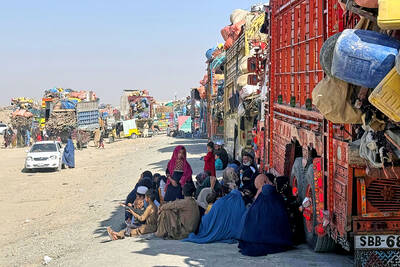Rows of coffins line a university classroom in the South Korean port city of Busan, ready for use in training the funeral directors of the future in a rapidly ageing country.
Growing numbers are finding work in the business of death as South Korea undergoes massive demographic change, with birthrates among the lowest in the world and almost half the population aged 50 or older.
Students at the Busan Institute of Science and Technology carefully draped a mannequin in traditional Korean funeral cloth, smoothing the fabric as if over real skin, before gently lowering it into a coffin.

Photo: Yonhap via EPA-EFE
“With our society ageing, I thought the demand for this kind of work would only grow,” said Jang Jin-yeong, 27, a funeral administration student.
Another student, 23-year-old Im Sae-jin, decided to enter the field after his grandmother died.
“At her funeral, I saw how beautifully the directors had prepared her for the final farewell,” he said. “I felt deeply grateful.”
More South Koreans are also living — and dying — alone.
Single-person households now account for about 42 percent of all homes in Asia’s fourth-largest economy.
A new profession has emerged reflecting that statistic: Cleaners who are called in to tidy up homes after their occupants, most of whom lived alone, have died.
Former classical musician Cho Eun-seok has cleaned many homes where people were found dead, sometimes months after their passing.
Their homes are “like their portraits”, Cho, 47, said.
He described heartbreaking traces: hundreds of neatly capped soju bottles and dusty boxes of gifts that were never opened.
South Korea has the highest suicide rate among developed nations, and these “lonely deaths” include those who died alone by their own hand.
Cho recently began receiving calls from used-car leasing companies to clean vehicles later found to be where clients ended their lives.
He is also developing a device to detect signs of unattended deaths that he said can harm the environment, causing pest infestations and forcing the disposal of belongings from entire households.
In summer, the smell spreads fast, “and nothing can be saved,” he said.
The home of a woman who had died recently in her late 80s was still filled with traces of her life when Agence France-Presse visited — an old air-conditioner, bottles of cosmetics and a portable toilet, while several walking sticks stood by the door.
The work sometimes requires more than just cleaning.
Kim Seok-jung once cleared the home of a late lyricist and found a set of songs she had not shared with her relatives. He turned them into a song for the bereaved family.
Cho remembered a high-school girl who lived alone in a gosiwon — a cramped room typically less than 5m2 — after she escaped domestic violence.
He visited once a month to clean. The teenager, suffering from depression, had been unable to tidy up herself. Piles of belongings and rotting food covered the bed, and the air was thick with flies.
However, she carefully looked after a small box, insisting Cho never throw it away. She took her own life in that small room a year later.
When Cho returned to clean, he found that a hamster had been living in the box all along. Beside it sat her guitar — she had dreamed of becoming a musician.
“The moment I saw the hamster, all I could think was that I had to save it and keep it alive,” Cho said.
Kim Doo-nyeon, a veteran in the funeral business, said he has a growing number of recruits in their 20s.
“When people live together, they share things... Even if one person dies, those items remain,” he said. “But when someone dies alone, everything must be cleared away.”
Back at class in Busan, Im admitted to some trepidation about his chosen career path.
“I am scared,” he said. “No matter how much you prepare, facing a deceased person is frightening.”

With much pomp and circumstance, Cairo is today to inaugurate the long-awaited Grand Egyptian Museum (GEM), widely presented as the crowning jewel on authorities’ efforts to overhaul the country’s vital tourism industry. With a panoramic view of the Giza pyramids plateau, the museum houses thousands of artifacts spanning more than 5,000 years of Egyptian antiquity at a whopping cost of more than US$1 billion. More than two decades in the making, the ultra-modern museum anticipates 5 million visitors annually, with never-before-seen relics on display. In the run-up to the grand opening, Egyptian media and official statements have hailed the “historic moment,” describing the

SECRETIVE SECT: Tetsuya Yamagami was said to have held a grudge against the Unification Church for bankrupting his family after his mother donated about ¥100m The gunman accused of killing former Japanese prime minister Shinzo Abe yesterday pleaded guilty, three years after the assassination in broad daylight shocked the world. The slaying forced a reckoning in a nation with little experience of gun violence, and ignited scrutiny of alleged ties between prominent conservative lawmakers and a secretive sect, the Unification Church. “Everything is true,” Tetsuya Yamagami said at a court in the western city of Nara, admitting to murdering the nation’s longest-serving leader in July 2022. The 45-year-old was led into the room by four security officials. When the judge asked him to state his name, Yamagami, who

DEADLY PREDATORS: In New South Wales, smart drumlines — anchored buoys with baited hooks — send an alert when a shark bites, allowing the sharks to be tagged High above Sydney’s beaches, drones seek one of the world’s deadliest predators, scanning for the flick of a tail, the swish of a fin or a shadow slipping through the swell. Australia’s oceans are teeming with sharks, with great whites topping the list of species that might fatally chomp a human. Undeterred, Australians flock to the sea in huge numbers — with a survey last year showing that nearly two-thirds of the population made a total of 650 million coastal visits in a single year. Many beach lovers accept the risks. When a shark killed surfer Mercury Psillakis off a northern Sydney beach last

‘NO WORKABLE SOLUTION’: An official said Pakistan engaged in the spirit of peace, but Kabul continued its ‘unabated support to terrorists opposed to Pakistan’ Pakistan yesterday said that negotiations for a lasting truce with Afghanistan had “failed to bring about a workable solution,” warning that it would take steps to protect its people. Pakistan and Afghanistan have been holding negotiations in Istanbul, Turkey, aimed at securing peace after the South Asian neighbors’ deadliest border clashes in years. The violence, which killed more than 70 people and wounded hundreds, erupted following explosions in Kabul on Oct. 9 that the Taliban authorities blamed on Pakistan. “Regrettably, the Afghan side gave no assurances, kept deviating from the core issue and resorted to blame game, deflection and ruses,” Pakistani Minister of